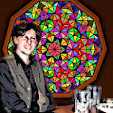The North American Summer School in Logic, Language, and Information (NASSLLI) is a summer school with classes in the interface between computer science, linguistics, and logic.

After previous editions at Stanford University, Indiana University, and UCLA, NASSLLI will return to Bloomington, Indiana, June 20–26, 2010. The summer school, loosely modeled on the long-running ESSLLI series in Europe, will consist of a number of courses and workshops, selected on the basis of the proposals. Courses and workshops meet for 90 or 120 minutes on each of five days, June 21–25, and there will be tutorials on June 20 and a day-long workshop on June 26. The instructors are prominent researchers who volunteer their time and energy to present basic work in their disciplines. Many are coming from Europe just to teach at NASSLLI.
NASSLLI courses are aimed at graduate students and advanced undergraduates in wide variety of fields. The instructors know that people will be attending from a wide range of disciplines, and they all are pleased to be associated with an interdisciplinary school. The courses will also appeal to post-docs and researchers in all of the relevant fields.
We hope to have 100-150 participants. In addition to classes in the daytime, the evenings will have social events and plenary lectures. Bloomington is a wonderful place to visit, known for arts, music, and ethnic restaurants. All of this is within 15 minutes walking from campus. We aim to make NASSLLI fun and exciting.
Website: http://www.indiana.edu/~nasslli/


